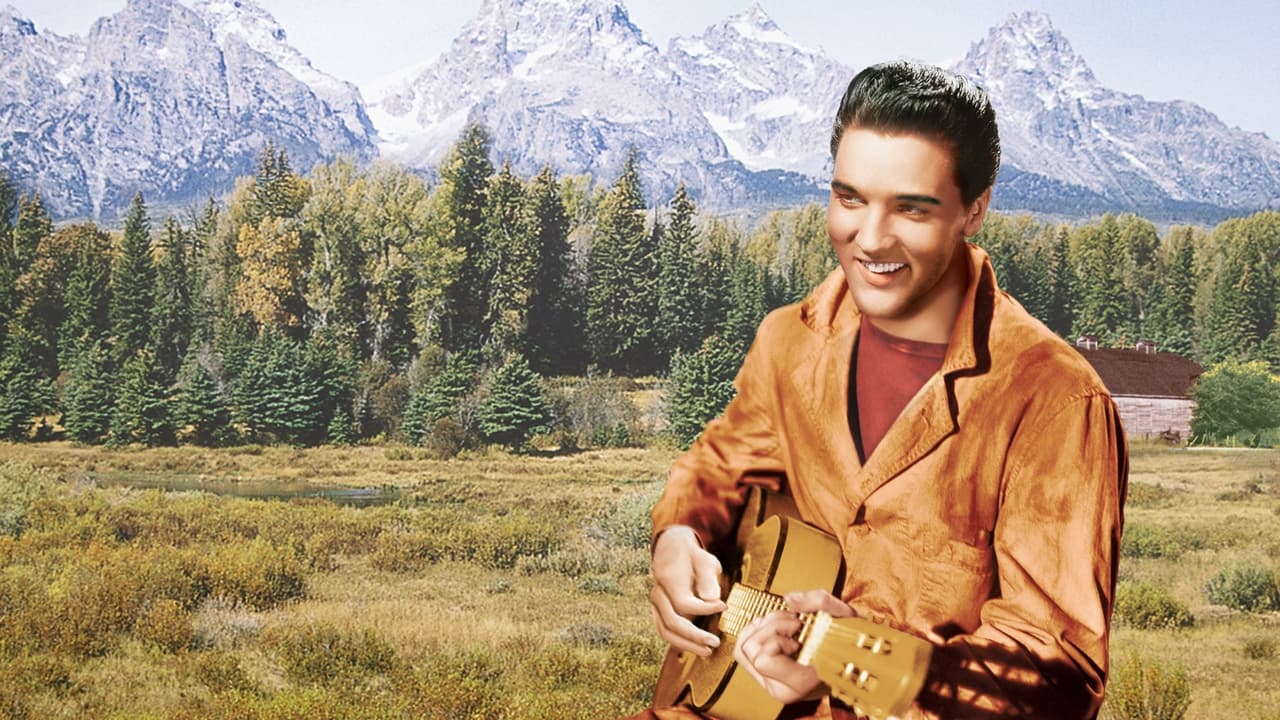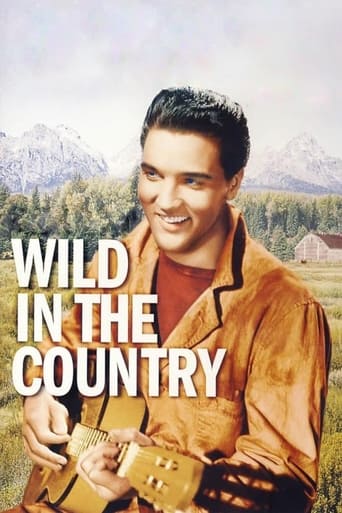tomsview
Apparently Elvis didn't think much of any of his films. According to "Being Elvis", a recent biography by Ray Connolly, Elvis hated the repetitive nature of the plots - same story different location. He felt he had never been given serious roles where he could show what he could do as an actor - he certainly didn't have to compete with Paul Newman and Steve McQueen for the roles in "Fun in Acapulco" and "Girls, Girls, Girls".Although he definitely had a point about the films toward the end of his Hollywood career, a number of his earlier films were actually based on novels -"King Creole", "Follow That Dream", "Flaming Star" and this one, "Wild in the Country" - stories that had more substance going in."Wild in the Country" has elements we expect from an Elvis picture, but then it gets complicated. This was made a few years after James Dean and Sal Mineo had shown that troubled teens were now a fact of life. Elvis plays Glenn Tyler, one of the troubled. After being placed on probation for injuring his brother in a fight, he receives counselling from psychologist, Irene Sperry (Hope Lange).The not inconsiderable charms of Millie Perkins and Tuesday Weld can't compete when Irene discovers that Glenn has a talent for writing and Glenn discovers that he has feelings for the older woman. In reality, Hope Lange was only two years older than 26 year-old Elvis.The film has a script by Clifford Odets, although one suspects he would not have considered "Wild in the Country" as his finest hour. He originally had Irene Sperry's character committing suicide at the end, it was changed, but it possibly reflected how Odets felt about selling out to Hollywood.However the film has a lot going on with well-defined characters and great locations in the Napa valley. If Elvis felt that most of his films only had stories to separate the songs, that was not the case in "Wild in the Country", there are a few songs, but the film is mainly the drama he craved.I find a lot of his films are fun to watch in the same way as "Beach Party" movies are. But there are a handful of films that have a depth he may not have appreciated at the time - "Wild in the Country" is one of them.
shepardjessica
This film (written by Clifford Odets of all people) is one of the better ones in Elvis' track record. The women are all beautiful accomplished actresses, especially Tuesday Weld, Hope Lange, and Millie Perkins. Good story-line involving moonshine and other things important to most small-town Americans.Not as interesting or involving as King Creole, this movie has qualities and showed that Elvis could have been a good actor if he wasn't doing tripe scripts all the time. This is a normal movie without unnecessary fight scenes or boring young actresses PRETENDING to think The King is a hot guy. Check this one out. Well worth your time for movie-lovers and Elvis fans.
Shane Paterson
This film is a tragedy, to me, in that it basically marks the end of Elvis' aspiration to be a 'serious' actor, an aspiration that he was quite capable of realizing. He'd still display flashes of brilliance in his '60s musical comedies, and he yet had the stellar "Follow That Dream" and the somewhat lesser "Kid Galahad" (as well as some late '60s roles) to come, but this film represents his last successful all-out stab at a dramatic role. Elvis plays a country boy, named Glenn Tyler, who's possessed of an enormous talent for writing -- encouraged by his now-dead mother -- but who lacks formal education and the supportive environment needed to allow that talent to bloom. After a series of run-ins with the law, at least some of them undeserved, Glenn is removed to his uncle's custody and it's when he's assigned a female case worker who recognizes his potential that things really begin to change.Hope Lange plays the proverbial older woman, a fixture of many Elvis movies. Pouty Tuesday Weld plays a prematurely world-weary teenaged mother who represents the fork in Glenn's road that leads to a life less than what he was capable of. Millie Perkins plays the girl from the 'right' side of the tracks whose father looks down on Glenn and his ilk and who represents a path that would take him firmly into the heart of Middle America (southern style). Hope Lange turns out to be the third path, perhaps propelling Glenn to where he might realize his fullest personal potential. Ironically enough, Tuesday Weld played a woman delivered a kidnapped Elvis in 1988's "Heartbreak Hotel" and Millie Perkins played Elvis' mother in the excellent 1990 TV series, "Elvis - The early Years."Red West, Elvis' former bodyguard and friend since high-school days, plays Elvis' hood/redneck brother in the film. He acquits himself well, though those of us who don't think that anything could justify his participation in the 1977 'tell-a''' book, "Elvis - What Happened?" might perhaps revel in the sound thrashing that Elvis delivers to Red at the film's beginning. Superathlete Rafer Johnson -- fresh from winning an Olympic gold medal for decathlon -- appeared in this film and Christina Crawford made her film debut here. Other familiar faces include Alan Napier (known to many as Alfred, the butler, in the '60s "Batman" series) and Gary Lockwood (Elvis' partner in "It Happened At The World's Fair"). William Mims is great in his role as the sleazy uncle. Jason Robards, father of Junior, made his last screen appearance in this film. For some reason, the film -- though set in the South -- was shot in the Napa Valley region of Northern California.This film deals with adult themes and it's perhaps not surprising that both Hope Lange and Tuesday Weld featured in "Peyton Place" properties. I understand that the "Peyton Place" franchise defined the modern soap opera, at least the prime-time kind. "Wild In The Country" is, at heart, a bit of a soap opera. I believe that the film was shot with two or three endings -- at least one had a suicide (can't recall if it was Elvis' or Hope Lange's), but they ended up going with the more upbeat conclusion.In all, I find this film a bit tedious to watch, perhaps explaining why I've only seen it twice now. I don't have a short attention span, but certain movies make me wonder if I'm developing one and this film falls somewhat into that category. As much as anything, perhaps it's a just a little too soapy for me, though a beautifully-realized film packed with convincing characterizations. Still, to me, it pales beside the excellent "Flaming Star." However, I've seen films far more glacial in pacing and many are lauded as 'art' -- to me they're just boring -- and this one, at least, has Elvis! And, to be fair, it tells a good story and does so in a well-crafted way. The songs separate this one from "Flaming Star," too, though few in number and every one is worked into the script naturally. Two of the songs cut from the film are as perfectly beautiful as the ballad that Elvis sings to Tuesday and were recorded in two versions, one with guitar only (for the film) and the other with added instrumentation and voices. The producers, at least, were trying to get away from the typical 'unrealistic' musical thing wherein music and voices come from nowhere.In this film Elvis again proved his tremendous potential as an actor, and is totally believable for most of his screen time (he does a great 'drunk' scene with Tuesday Weld, too). The film may not be as solid and tight as "Flaming Star" but Elvis' performance is still very strong and he is again ably supported by an excellent cast. It's nothing short of tragic that Elvis' acting ability would never again be explored to the extent that it was in this and the other 1960 Fox film that Elvis did, "Flaming Star." By the time that Elvis finished the '60s and got around to filming some atypical movies (e.g., "Charro!," "The Trouble With Girls," and "Change Of Habit") the damage was already done and the films were subverted either by substandard scripting or by Elvis' own lack of enthusiasm for what had become, over the preceding seven years or so, increasingly a despised exercise in commercialism. Unfortunately, "Wild In The Country" failed to even live up to the mild box-office reception that "Flaming Star" had generated, and we'll never know how things might have turned out differently had Elvis continued to make high-quality dramas (comedies and adventure yarns, for that matter) instead of the lightweight musical 'vehicles' that largely became the norm. About four months after filming "Wild In The Country" Elvis began work on "Blue Hawaii," quickly to become his most successful film of the 33 that he made, and the rest is history.

